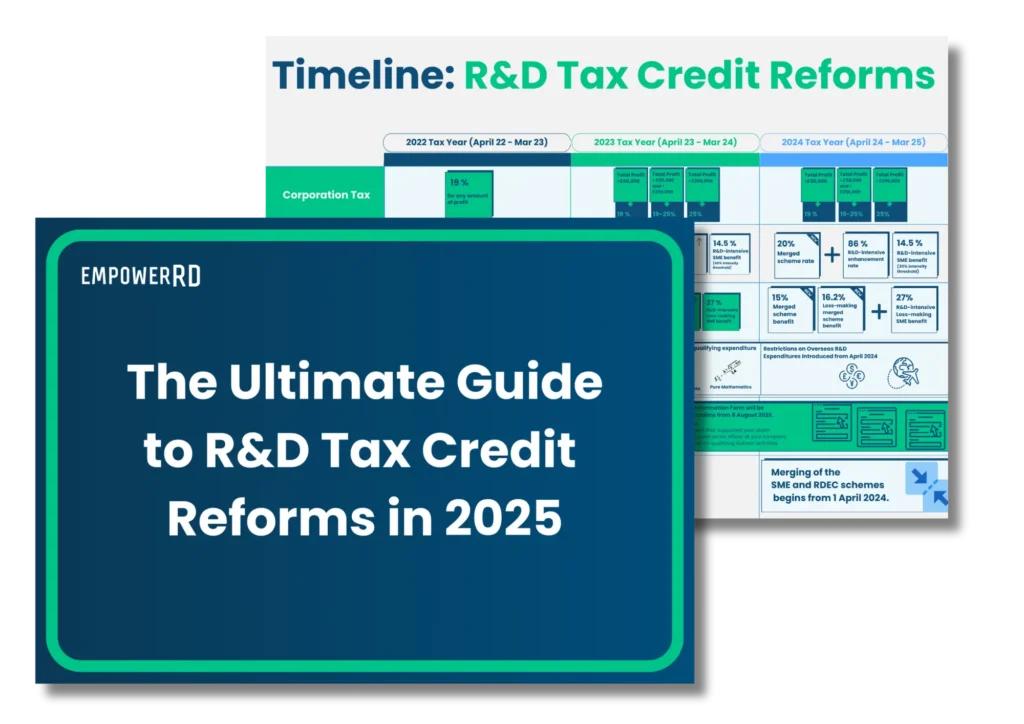Relying on your R&D efforts to speak for themselves won’t cut it
Recently, a wave of headlines has spotlighted the state of R&D tax credits in the UK. Reports from the BBC, Guardian, and Sifted revealed that HMRC estimates £4.1 billion was lost to error and fraud in the R&D tax credit scheme between 2020 and 2024. This has raised valid concerns among businesses that rely on the scheme for innovation and growth. HMRC has labelled the scale of the issue as “clearly unacceptable,” prompting reforms and compliance measures starting in 2021 to combat these challenges.
However, while the figures may initially alarm, the reality is more nuanced and ultimately positive. HMRC’s Annual Report 2023-24 indicates that error and fraud have dropped by over 50% in just two years—a promising sign that compliance measures are effective. By enforcing these measures, HMRC ensures that funds intended for innovation genuinely support deserving projects.
The past few years have been tough for companies, and HMRC has faced its share of teething problems. Yet, with the right guidance, businesses can successfully navigate this evolving R&D tax credit landscape, benefiting from a more robust and trustworthy process.
Understanding the increased scrutiny
Over the past few years, HMRC has ramped up its scrutiny of R&D tax credits, and it’s really a response to some troubling levels of error and fraud that have hurt the scheme over the years. In 2021-22, we saw an error and fraud rate of 17.6%, leading to billions of taxpayer pounds being misallocated. This situation called for a strong response from HMRC to safeguard the scheme’s integrity and ensure that funds go to truly innovative businesses.
HMRC’s response: Strengthening compliance
To address these issues, HMRC increased its R&D compliance teams from around 100 staff in 2020/21 to 500 staff today. This expansion reflects the government’s commitment to tackling the problem head-on. Alongside this expansion in personnel, HMRC has introduced more stringent measures, such as the Additional Information Form (AIF), as well as the Pre-notification form, and has significantly increased the number of compliance enquiries. These steps are part of a broader strategy to recoup lost funds and prevent further abuse of the scheme.
Random enquiry checks have been a key element of HMRC’s approach. While these checks can be frustrating for businesses, they have played a crucial role in reducing error and fraud. Error and fraud in the scheme have dramatically reduced—from £1.337 billion in 2021-22 to £601 million in 2023-24. These figures highlight the effectiveness of HMRC’s increased scrutiny, which has helped to more than halve the error and fraud rate to 7.8% in 2023-24.
Improvements and the path forward
It’s no secret, HMRC has faced challenges in recent years, but there are clear signs of improvement. Payout timings have stabilised, and the overall process has been streamlined.
An HMRC spokesperson noted that “the overwhelming majority of valid claims are paid on time,” a statement we have witnessed first-hand at EmpowerRD. This reinforces our belief in the positive changes taking place at HMRC.
It’s also encouraging to note that in the 2021/2022 random enquiry programme, only 10% of claims reviewed were found to be fraudulent, while the remaining 90% stemmed from administration errors. This underscores that HMRC has successfully deterred fraudsters from the company and advisory sides.
Another important takeaway from the random enquiry programme: even if your company is doing something truly innovative, it’s essential to demonstrate how your work makes an advance in science or technology, and this means sticking to HMRC’s strict guidelines. Relying on your R&D efforts to speak for themselves won’t cut it. Articulating these projects clearly to HMRC is crucial to avoid scrutiny.
Navigating the new landscape with confidence
With HMRC’s efforts to raise standards, businesses are understandably concerned about potential delays and the increasing complexity of the claims process. Startups, in particular, worry about the financial strain that prolonged enquiries and slower payouts could cause. One climate tech founder told Sifted that their case has been ongoing for over a year and a half, expressing that their company “won’t be able to survive” if HMRC continues its case for repayment. Read more here.
As we’ve noted, scrutiny has intensified, meaning past strategies may no longer suffice. Companies must keep a detailed audit trail of qualifying R&D expenditures, demonstrate the competency of their R&D project leaders, and clearly articulate their project’s technical aspects. What used to be an annual in-house review may not be adequate now.
The Importance of Quality Advice
Partnering with an R&D specialist can really help avoid lengthy enquiries like the climate tech company. While it can be frustrating—especially when you know you’ve conducted genuine R&D—HMRC has a responsibility to protect taxpayer money.
In the current landscape, the quality of advice and support businesses receive is critical. HMRC’s recent consultation on raising standards in the tax advice market signals a push to improve the qualifications and regulation of advisors, particularly in R&D tax relief.
The rise of unscrupulous advisors in the industry, particularly before the compliance measures implemented by HMRC, makes this especially important. Some advisors have been criticised for promoting illegitimate claims and using aggressive sales tactics to target companies that don’t qualify for R&D tax credits, often lacking the necessary expertise to produce compliant claims. Fortunately, the compliance checks of recent years have helped eliminate these bad actors, resulting in a market primarily populated by reputable and qualified advisors.
For businesses, teaming up with seasoned R&D advisors who know the ins and outs of the R&D tax credit scheme is key. Advisors familiar with HMRC guidelines can help companies navigate the scheme’s requirements, making sure claims are not just compliant but also optimised.
EmpowerRD’s approach to navigating the complexity
At EmpowerRD, we’ve tailored our approach to meet the challenges innovative companies face in today’s increasingly scrutinised landscape. By combining expert human oversight and a next-gen collaboration platform, we aim to take the pain out of building a compliant and optimised R&D claim. This approach has proven highly effective and we’re proud our enquiry rate sits below 5%, significantly lower than the 20% industry average in 2023.
Our technology-driven solution enhances accuracy by seamlessly integrating with accounting systems, facilitating easy data capture, and providing ongoing risk assessments to ensure claims stay aligned with HMRC guidelines. But technology alone isn’t enough. Our team of seasoned R&D specialists, including former HMRC inspectors and technical experts, write the technical narrative for you and meticulously reviews every claim to minimise delays and reduce the risk of enquiries.
By focusing on these critical areas, EmpowerRD ensures that our clients can navigate the complexities of the R&D tax credit process with confidence, securing the support they need to continue driving innovation.
“With HMRC’s increased scrutiny, it’s crucial that R&D claims are meticulously prepared. At EmpowerRD, we perform multiple checks throughout the claims process—both through our platform and by our R&D specialists—to ensure every claim meets HMRC’s standards. This thorough approach reduces the risk of delays and enquiries, allowing our clients to focus on innovation with confidence.”
Katie Pearce, Head of Claim Quality at EmpowerRD
Compliance and quality: The heart of your claim
As HMRC intensifies its scrutiny and with the merging of the R&D scheme beginning to take effect, businesses must adopt a proactive approach to navigate this evolving landscape. The enhanced compliance measures have already proven effective, significantly reducing errors and fraud in R&D tax credit claims. While this new environment brings challenges, it also paves the way for genuinely innovative companies to access the support they need.
The key takeaway is clear: navigating the R&D tax credit scheme successfully now requires more than just innovation; it demands precision, compliance, and expert guidance. Working with a reputable advisor ensures that your claims are robust, well-documented, and capable of withstanding scrutiny. In a market where the standards are rising, this level of expertise is not just valuable—it’s essential.
As we move forward, the emphasis on quality and compliance will continue to shape the industry, weeding out those who do not meet the necessary standards. This shift ultimately benefits businesses by creating a more trustworthy and reliable R&D tax credit scheme.
At EmpowerRD, our focus remains on helping businesses navigate these complexities with confidence, ensuring they can continue to innovate and grow without the fear of unnecessary delays or enquiries.
Get in touch
If you think you could use an extra pair of hands for the additional details you’re now required to provide, we at EmpowerRD are happy to help. With our R&D tax specialists and user-friendly platform, your R&D tax credit claim will be in good hands. Get in touch and let’s see how we can help you succeed.












